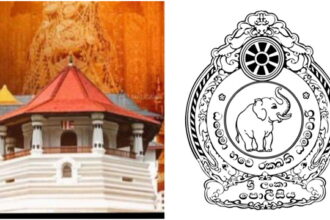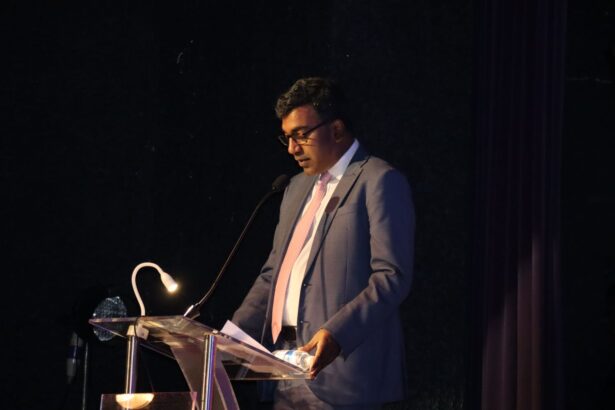Orator at the XIth St. Margaret’s Oration Professor of World History at Cambridge University Professor Sujit Sivasundaram
By Devika Brendon
Bishop’s College launched a limited edition book to commemorate 150 years of the school last week. The book titled “The Mystery, The Memory, The Magic’, authored by Savithri Rodrigo, is available through the Past Pupils’ Association of Bishop’s College.
It is impressively large, substantially solid, and replete with rich and interesting content.
This year is the 150th Anniversary of one of the great girls’ schools of this country. There have been several public events which have been organised to recognise this milestone, including the book launch, on Wednesday the 22nd of January, of a magnificent 520 page Limited Edition coffee table book, filled with history, little known facts, references and celebrations of past pupils, and photographs of generations of students, collectively called Bishopians.
The launch was a beautifully organized event, which followed the XIth Sisters Of St Margaret’s Oration presented by Cambridge scholar Professor Sujit Sivasundaram. The point was gracefully made early on in the speech that many men as well as women had their early schooling at Bishops, as boys were admitted in the junior years to the school.
The entire Auditorium was filled with generations of ladies dressed in a variety of shades of purple, the school colour, grandmothers and even great grandmothers accompanying their daughters and grand-daughters. The pride felt by the attendees of their historic school was strongly expressed both verbally and in smiles and gestures, and the bright faces and beautiful clothes added vibrancy and joy to the atmosphere. The young students acting as ushers, in their signature white dresses and purple school blazers, were well trained to warmly welcome and emplace all the guests.
The presentations included a documentary about the origins and impact of the Sisters of St Margaret from their time in East Grindstead in England to their journey to Colombo. What was most notable was the visionary and forward thinking leadership shown by many of the school’s leaders, from the founder of the school Frances Chapman – the first Bishop of Colombo James Champman’s wife to the nuns of the Order of St. Margaret, in England, to the professional women of Sri Lankan heritage who in more recent times have led the school community.
I did not myself attend Bishops College, being educated in another country, but my mother Prof Yasmine Gooneratne and her sisters were all Bishopians. My mother’s eldest sister, Mrs. Gwen Dias Abeysinghe, was a former Principal of Bishops College. I was interested to see the school in all its glory, as my Mother spoke often of her schooldays, the teachers who still lived in her memory after decades, and the nuns who presided over the schoolgirl cohort in those years. My mother, when choosing my school in Australia, had looked for a school which upheld similar values to Bishops.
Observing the ladies in their flowing purple sarees and dresses, I was reminded of the portrait of a Lady of Noble Character from the Bible. The full description is found in the Book of Proverbs, Chapter 31, verses 10-31.
The lady is portrayed as competent and responsible, fulfilling a myriad duties and social roles with dignity, dedication and grace. She runs her household efficiently and with forethought, ensuring that all within her domain are well fed and clothed and cared for. She is generous, and charitable, and has wisdom and knowledge to offer. Bishopians are indeed known to be charitable, and philanthropic.
She ‘sets about her work vigorously; her arms are strong for her tasks’. And because she conducts herself faultlessly, and integrity, she has no fear or anxiety for the future. ‘She is clothed with strength and dignity; she can laugh at the days to come.’
Most importantly, she develops her character, rather than focusing on appearances, knowing that ‘Charm is deceptive, and beauty is fleeting.’ Bishop’s has produced several famous beauty queens, and media personalities, as well as corporate and government leaders, activists and journalists, and all of them are women of character – femmes formidables.
All the ladies I have known who were educated at this school, although distinctly individual personalities, and from different generations, are women of decision and purpose, envisioning and working towards a higher ideal than mere fame or commercial success; and committed to social upliftment rather than only personal glory.
They all burn the midnight oil in their work, whether meeting copy deadlines or travelling outstation to interview remote communities; and while they are often seen, like the Lady of Noble Character, ‘clothed in fine linen and purple’, and photographed in The Best Dressed Lists in glossy pages of society magazines, these clothes are likely to be sustainable, upcycled, or made by women in rural areas who are working to improve the lives of their families and alleviate poverty in their communities.
The words expressed by the Orator, by the PPA, and by Savithri Rodrigo herself, both highlighted and embodied a key theme of the school, which is its adaptability, resilience and responsiveness to social change. The decisions made by the school authorities at key junctures in its history tended towards inclusiveness of racial and socio-economic diversity, and these choices clearly created a very open minded and forward-thinking community, in the midst of a very conservative society. Many families of all the ethnic communities in the country have had generations of ties to the school, and showcase the co-existence and respect with which our forbearers were educated, and brought up together.
People who did not attend schools with a heritage like this may feel deprived of what is popularly known today as ‘privilege’, which is often narrowly defined only in material or monetary terms. But I would argue that there is also great privilege of a far rarer kind today in being educated within an ethical and outward looking community. Every religion has its own renowned schools, which enable students to learn a curriculum within a context of social and cultural, moral and ethical values. The values promoted by Bishops College focus on service to the country, and leadership with integrity.
What this school enabled from its inception was the formation of a broader and deeper vision of the capabilities of womanhood, and the significant impact of female leadership, which has had a profound effect on the country, and especially in recent years, as the ramparts of masculine dominance in every field and sphere of life have been gradually made more accessible, by the ceaseless work of generations of women in the past 70 years.
Such an education equipped its students to go out into the world, and operate within its structures to the benefit of all.
The Bishop of Colombo Rt. Rev Dushantha Rodrigo is presented the 150th anniversary limited edition book – The Mystery, The Memory, The Magic – by President of the Bishop’s College Past Pupils’ Association Hasnah Mohideen. Standing L to R: Author Savithri Rodrigo and Co-Chairs of the 150th Anniversary Book Committee Savithri Wijesekera and Ramola Sivasundaram
Prime Minister Harini Amarasuriya, a past pupil of Bishop’s College chats with author Savithri Rodrigo after being presented her book
The Mystery, The Memory, The Magic – the limited edition book published by Bishop’s College to celebrate its 150 year anniversary
The post Bishops and Queens and The Colour Purple: 150 Years of Bishops College appeared first on Newswire.





